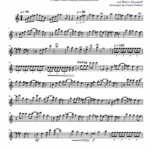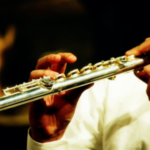Best Flutes for Advanced Players
For the seasoned flutist ready to transcend to new heights, selecting the right instrument can make all the difference. The flute isn’t just a tool—it’s a partner in crafting your musical expression.
As your skills evolve, so should your instrument. Advanced players need flutes that offer precision, impeccable intonation, and a rich tonal palette to captivate audiences. But with so many choices on the market, finding the perfect match requires discerning judgment.
In this guide, embark on a journey to discover flutes that provide unparalleled responsiveness and expressive capabilities. Whether your passion lies in the mellifluous passages of classical pieces or the bold expressions of contemporary works, equipping yourself with a top-tier flute can elevate your performances and unlock your true artistic potential.
Let’s explore the flutes that will not only meet your advanced demands but inspire and challenge you to elevate your craft.
Choosing the Right Material for Professional Flutes
The material of a flute significantly influences its sound quality, dynamics, and playability. For advanced players, understanding these subtle differences becomes essential.
Silver is renowned for its bright, clear tone and is a popular choice among professionals. It offers excellent projection, making it suitable for solo performances and orchestral settings.
Gold, on the other hand, enriches the flute’s sound with a warmer, darker timbre. It’s often chosen by those seeking a fuller, more resonant sound. However, it tends to have a steeper price tag.
Exploring Alternative Options
Platinum flutes are the epitome of luxury and depth, providing a dense, powerful tone. Though rare and costly, they cater to players who prioritize bold, striking sound.
Consider also the unique attributes of wood flutes. While less common in modern classical music, they’re cherished for their earthy, rich sounds, often used in folk or baroque settings.
Ultimately, the right material enhances not just how the flute sounds, but also how it feels in your hands. Personal preference and musical goals should guide this critical choice, ensuring your instrument best complements your artistic vision.
Exploring Key Features Essential for Advanced Players
When it comes to performance, the nuanced features of a flute can greatly impact an advanced player’s experience. Attention to these key elements can elevate your playing from proficient to exceptional.
One pivotal feature is the headjoint design, which is crucial in shaping the flute’s responsiveness and tone. A well-crafted headjoint can enhance articulation and melodic fluidity, allowing for clearer execution of complex passages.
The key mechanism is another critical component to consider. For advanced players, precision and reliability in the keywork ensure technical agility and ease during quick transitions. Look for a flute with smooth, dependable mechanics that won’t hinder your performance.
Ergonomics also play a significant role. A flute that feels comfortable means reduced strain during extended practice or performance sessions, enabling focus purely on musical expression.
Lastly, don’t overlook the importance of open or closed hole key systems. Each offers distinct benefits, so it’s essential to choose based on your style and genre preferences.
Incorporating these key features into your selection process can not only refine your sound but also significantly enhance your confidence and capability on stage.
Comparing Traditional Vs. Modern Flute Designs
The design of a flute can have a profound impact on your playing experience, with both traditional and modern designs offering unique qualities.
Traditional flutes, often made from wood, possess a timeless elegance. They deliver a warm, rich sound that’s ideal for classical and Baroque music, bringing authenticity to period pieces. The craftsmanship of these instruments speaks to centuries of musical heritage, providing a distinct charm and tonal character.
Advantages of Modern Designs
Modern flutes, primarily constructed from metals, offer innovations in precision and durability. These designs focus on enhancing playability and projection, making them suitable for a wide range of genres. Technological advances provide flutists with consistency in tuning and the robustness necessary for demanding performances.
Key developments in modern designs also include improved ergonomic features that cater to the player’s comfort and technical prowess. These innovations aim to support the advanced flutist in executing intricate passages with ease.
Ultimately, the choice between traditional and modern designs depends on your artistic goals and the sound you want to achieve. Embrace the opportunity to explore both realms to find the flute that aligns perfectly with your musical ambitions.
Understanding the Importance of Tone Quality
For advanced flutists, tone quality isn’t just about making pleasant sounds; it’s the essence of your musical voice. A rich, expressive tone captivates audiences and conveys the emotional depth of your performance.
The ability to produce a consistent, vibrant tone across all registers is paramount. It enables nuanced dynamics and articulation, allowing you to highlight the subtleties inherent in your music. Achieving this requires both technical control and an instrument capable of responding crisply to your intent.
Selecting a flute with superior tone quality enhances your ability to explore a vast emotional and dynamic range. This is particularly crucial when performing complex compositions that demand both power and delicacy.
Besides this, a flute with excellent tone quality inspires confidence, allowing you to focus on the expressive aspects of your playing. Whether in a solo setting or part of an ensemble, the right instrument amplifies your unique sound signature.
In essence, tone quality not only defines your individual style but also elevates your entire musical expression. Embrace it as a core component of your artistry, underpinning every note you play.
Customizing Your Flute Setup for Maximum Performance
Personalizing your flute setup can significantly enhance your performance and personal comfort. As an advanced flutist, you have the freedom to tailor your instrument to meet your specific needs.
Begin with the headjoint, as it greatly influences your sound and playing style. Experimenting with different cuts and materials can help you find one that complements your unique tone.
Key configurations are another area ripe for customization. Adjusting the key height and spring tension can optimize your technical efficiency and ease of play, allowing for greater agility in fast passages.
Fine-Tuning Accessories
Accessories like the lip plate and crown can also be tailored to affect sound quality and playing comfort. Small adjustments here can lead to noticeable improvements in breath control and tonal clarity.
It’s also worth considering alternative setups for different musical contexts. For instance, you may want a different setup for orchestral playing versus solo performances to suit varying acoustic demands.
Ultimately, customizing your flute allows it to become an extension of you, supporting your artistic endeavors. By exploring and adjusting these elements, you craft not only an instrument but a bespoke tool that unleashes your full performance potential.
Mastering Advanced Techniques with Specialized Flutes
As an advanced player, honing intricate techniques is critical for elevating your artistry. Specialized flutes can play a pivotal role in this ongoing journey, offering features tailored to facilitate complex maneuvers.
The integration of advanced mechanisms, such as split E mechanisms or C# trill keys, can greatly enhance your technical repertoire. These features offer greater control and fluidity, especially in executing challenging passages with precision.
Flutes with extended range capabilities, like low B footjoints, expand your expressive palette, allowing you to explore a broader musical repertoire. These added notes can be essential for tackling contemporary compositions.
Specialized flutes also regularly incorporate customizable aspects that aid in mastering subtle techniques, like harmonics, multiphonics, or flutter tonguing. These nuances require an instrument that responds dynamically to air pressure changes and embouchure adjustments.
Investing in a specialized flute doesn’t just support technical proficiency; it also encourages creative exploration, inspiring you to push boundaries and innovate. With a flute optimized for advanced techniques, you’ll find new avenues for expression that showcase your skills and passion on any stage.
Exploring Extended Range Flutes and Their Benefits
For the advanced flutist seeking to expand their musical horizons, extended range flutes offer exciting possibilities. These instruments provide additional keys, typically extending to low B or higher in the altissimo register, which can transform your repertoire.
The primary advantage of extended range flutes lies in their versatility. With these instruments, you can access a wider range of compositions, particularly those that demand notes beyond the standard range of a concert flute. This capability enables you to tackle modern pieces that showcase intricate, expansive melodies.
Advantages in Performance Settings
In an orchestral or ensemble setting, possessing a flute with an extended range ensures you’re well-equipped to perform a variety of parts, from luscious low harmonies to soaring high descants. This adaptability can increase your value as a performer in diverse musical contexts.
It’s also worth noting, the challenge of mastering the extended range can invigorate your practice routine, inspiring you to refine your technique and breath control. Acquiring proficiency across this expanded scale deepens your musicianship and showcases your commitment to excellence.
Adopting an extended range flute ultimately amplifies your expressive potential, opening the door to innovative interpretations and creative exploration beyond the conventional limits.
The Bottom Line: Elevating Your Performance with the Perfect Flute
Choosing the right flute is more than a mere decision; it’s a pivotal step towards realizing your full musical potential. As you’ve journeyed through the intricacies of advanced flutes—considering materials, key features, and specialized designs—the importance of aligning your instrument with your musical goals becomes evident.
It’s clear that each flutist’s path is unique. Some may gravitate toward the warm, historical nuances of a wooden flute, while others may be inspired by the precision and brilliance of modern metal designs. Exploring these options allows you to find an instrument that resonates with your artistic vision.
By the same token, customizing your flute provides another layer of personalization. Tailoring your setup to your preferences can enhance your comfort and technique, facilitating an even more seamless and expressive performance. This personalization transforms your flute from a simple instrument into a deeply personal tool that supports your musical explorations.
Considering extended range flutes and advanced techniques reveals further opportunities to refine your craft. These elements challenge and inspire, pushing you to innovate and expand your expressive capabilities.
Ultimately, whether you’re performing a delicate solo or a dynamic orchestral part, the right flute can make all the difference. It ensures that your artistic voice is heard clearly and compellingly. By equipping yourself with an instrument that matches your skills and aspirations, you’re not just playing music—you’re elevating your entire performance experience.
So, take the time to choose wisely, customize thoughtfully, and play passionately. With the perfect flute in hand, you’re ready to captivate your audience and embark on your next musical adventure.























